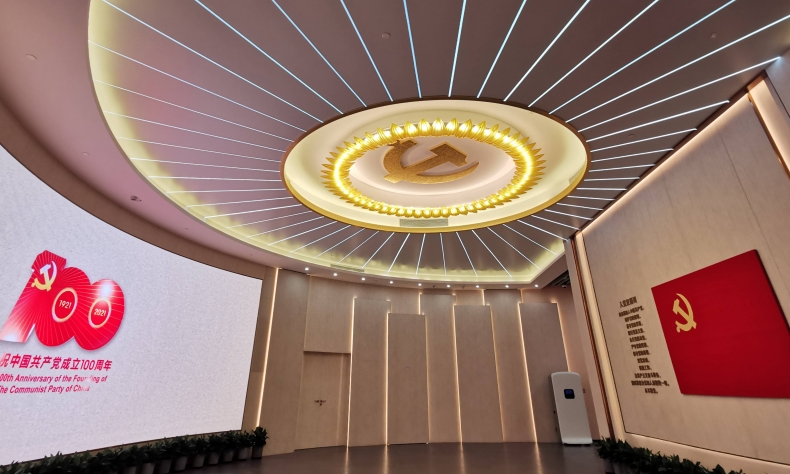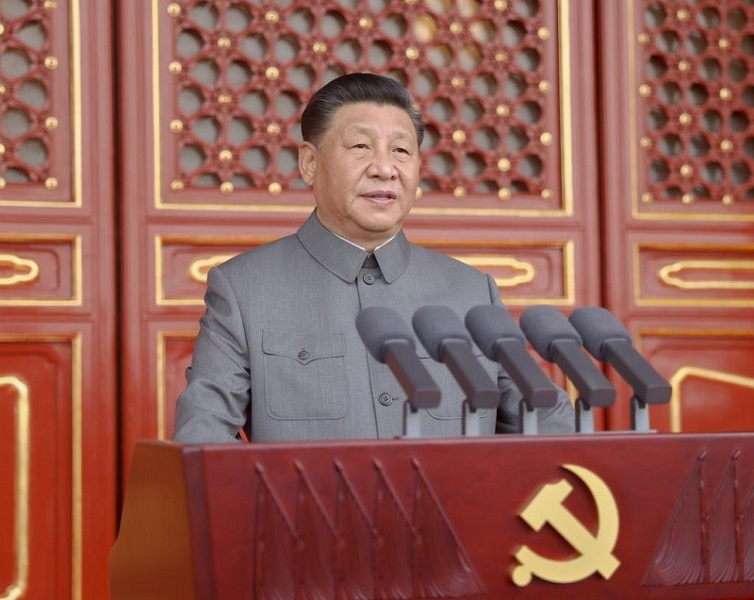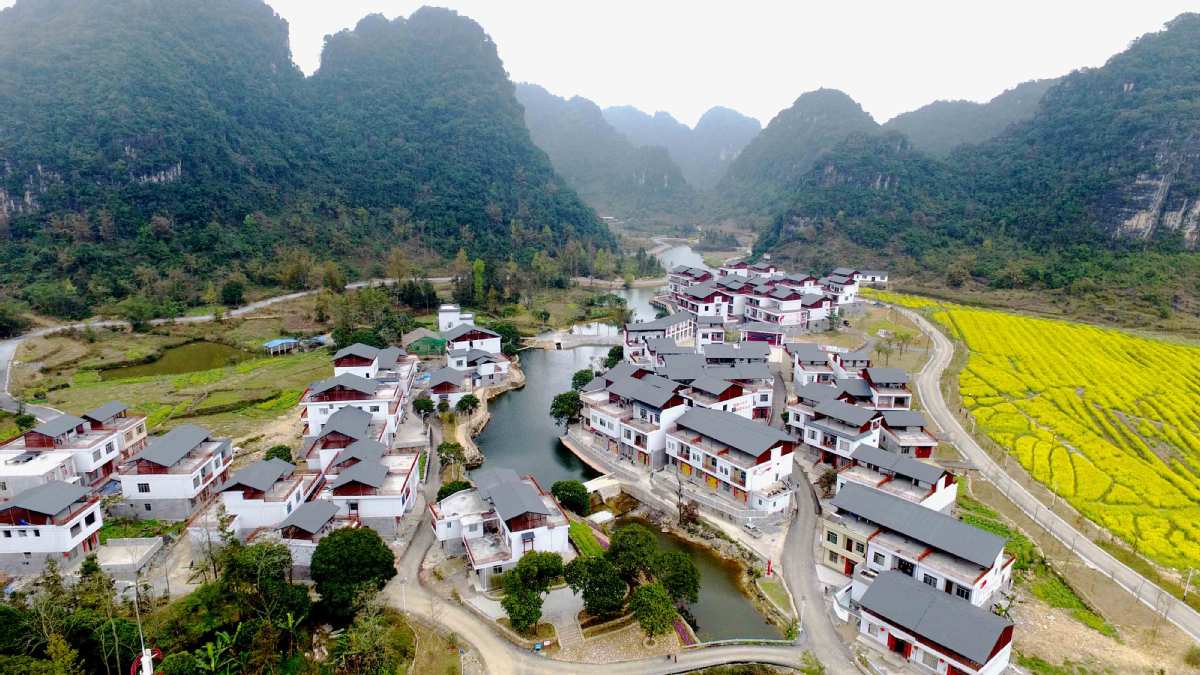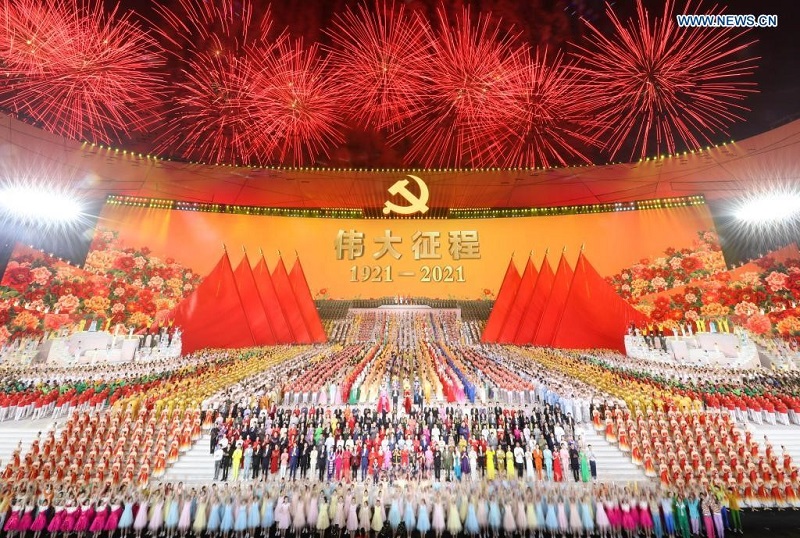Setting Out on the Great Rejuvenation

The public good of thoughts that the CPC provides has instilled confidence and hope in today’s turbulent world.
The centenary of the Communist Party of China (CPC) was marked by a grand gathering held on July 1 in Beijing’s Tian’anmen Square. General Secretary of the CPC Central Committee Xi Jinping, who is also Chinese president and chairman of the Central Military Commission, declared in his speech at the ceremony that China had realized its first centenary goal of building a moderately prosperous society in all respects, and that the nation is now heading toward its second centenary goal of building China into a great modern socialist country in all respects.
This avowal was greeted with massive wave of cheers and applause that swept the square. Among the hundreds of thousands present at the Tian’anmen Square ceremony were Xu Jing and her colleagues from the Office of Beijing Municipal Leading Group for Poverty Reduction Cooperation and Assistance, their faces wreathed in jubilant smiles. “I’m so thrilled to be here. Under the Party’s leadership our country has made incredible achievements. As a CPC member, this makes me feel very proud,” Xu told China Today. The people’s confidence in and wholehearted support for the Party was palpable throughout the square. In Xu’s words, “The reason is clear. Everything our Party has done has been with the sole aim of serving the people and improving their lives.”
Historic Achievements
General Secretary Xi observed in his speech, “We established the Party’s basic line for the primary stage of socialism, resolutely advanced reform and opening up, overcame risks and challenges from every direction, and founded, upheld, safeguarded, and developed socialism with Chinese characteristics, thus bringing about a major turn with far-reaching significance in the history of the Party since the founding of the People’s Republic of China. This enabled China to transform itself from a highly centralized planned economy to a socialist market economy brimming with vitality, and from a country that was largely isolated to one that is open to the outside world across the board. It also enabled China to achieve the historic leap from a country with relatively backward productive forces to the world’s second largest economy, and to make the historic transformation of raising the living standards of its people from bare subsistence to an overall level of moderate prosperity, and then ultimately to moderate prosperity in all respects.”

Under the leadership of the CPC, China has achieved remarkable progress on many fronts. Han Wenxiu, an official with the Central Committee for Financial and Economic Affairs, remarked at a press conference on June 28 that, in stark comparison to the few dozen dollars the country had upon its founding in 1949, China’s per capita GDP now exceeds US $10,000. Over the same period the average life expectancy of Chinese people increased from 35 years to 77.3 years and infant mortality dropped from 200 per 1,000 to 5.6 per 1,000.
The white paper “The Communist Party of China and Human Rights Protection–A 100-Year Quest” released last June by the State Council Information Office, states that China has put in place the world’s largest social security system, encompassing pensions, medical and health care, and social assistance, expanding coverage and improving protection. In 2020, the basic medical insurance scheme covered 1.36 billion people. As of April 2021, around one billion people had subscribed to basic old-age insurance. The right to education is guaranteed. The white paper states that free compulsory education is available across the country. In 2020, the completion rate of its free nine-year compulsory education was 95.2 percent — equal to the average in high-income countries. There was also a 91.2 percent gross enrollment in China’s senior secondary education — higher than the average in upper-middle-income countries. In 2020 about 9.7 million undergraduate students and 1.1 million postgraduates enrolled in colleges and universities.
While on an inspection tour of Peking University on May 2, 2018 Xi Jinping emphasized that China must hold firm to self-reliance and independent innovation in the drive toward major sci-tech achievements that should be considered a strategic support for national development. As regards technological innovation, China’s historic and outstanding holistic changes have vaulted the country to an upper global ranking in the field. Among the country’s recent achievements in major science and technology innovations are the deep-sea manned submersible Jiaolong, the Five-hundred-meter Aperture Spherical Radio Telescope, the Dark Matter Particle Explorer (DAMPE), and the Micius quantum experiment satellite, as well as a range of breakthroughs in the aeronautics and space exploration field. Science and technology indeed play an ever more important role in the country’s social and economic development.
The International Secretary of the Communist Party of Britain John Forster remarked in an interview with Xinhua on how striking China’s accomplishments are. Based on his several visits to the country in recent years he was particularly “amazed at many of the technological achievements in industries, from artificial intelligence to aeronautics to space.” But in his opinion, having witnessed how people’s living standards had improved in “the villages and towns” in the country he has visited, China’s most important achievements have been on the ground.
For the Good of the People
Xi Jinping said in his speech that the Party has in the people its roots, its lifeblood, and its source of strength. The Party has always represented the fundamental interests of all Chinese people; it stands with them through thick and thin and shares a common fate with them. The Party has no special interests of its own – it has never represented any individual interest group, power group, or privileged stratum.
The original aspiration and the mission of the CPC is to seek happiness for the Chinese people and rejuvenation for the Chinese nation. This people-oriented stance is the CPC’s fundamental political feature, one that also distinguishes Marxist parties from others.
Since the 18th National Congress of the CPC held in 2012, the central Party leadership with Xi Jinping at the core has made specific plans and set clear goals and tasks for winning the battle against poverty. This has entailed pooling the resources of the Party and of the entire country. By the end of 2020, China achieved on schedule its goal of eliminating absolute poverty. All 99 million rural poor living below the current poverty line were lifted from poverty, along with all 128,000 villages and 832 counties classified respectively as impoverished. Comprehensive regional poverty now no longer exists. China is 10 years ahead in its plan to realize the goals of the United Nations 2030 Agenda for Sustainable Development. Representing as it does more than 70 percent of the global poverty reduction campaign, China’s contribution has significantly reduced the world’s impoverished population.

Maria Teresa Mola, vice-president of the Party of the European Left, expressed in a recent interview with Xinhua her approbation of the CPC’s people-oriented development philosophy. She was particularly impressed with Chinese President Xi Jinping’s remark during his state visit to Italy in March 2019, that “for the good of my people, I will put aside my own well-being.” President of the Communist Party of Spain Jose Luis Centella remarked that the CPC’s consistent dynamism over the past 100 years may be ascribed to its “always being linked to the people, (and) always having been the people’s party.” He further observed that the CPC attaches importance to serving the interests of the people and formulating policies based on the people’s needs, “in this way making the Communist Party of China truly the party of the people — something clearly evident amid the pandemic.”
From “ensuring adequate food, shelter, and clothing” to “completing the building of a moderately prosperous society in all respects,” the work of the CPC has been expedited through a people-centered approach, so continuously improving the people’s well-being. McKinsey & Company predict that by 2022 more than 75 percent of urban Chinese households will have an annual disposable income of RMB 60,000 to RMB 229,000.
Results of an Edelman Trust Barometer trust and credibility survey released in July 2020 show that 95 percent of Chinese people have trust in their government — ranking first among the countries surveyed. China has maintained the top ranking for three consecutive years. Meanwhile, the Harvard Kennedy School report “Understanding CCP Resilience: Surveying Chinese Public Opinion through Time” also released in July 2020, revealed similar findings. The high rate of people’s support for and trust in the Party demonstrates the people’s satisfaction with the Party.
The membership of the CPC has grown from 50-odd at its inception to around 95 million today, making it the world’s largest Party. According to the New China Research report “People First: Political Commitment of the Century-old Community Party of China” released on June 28, this high level of approval is attributable to the CPC being the people’s choice. This, in itself, reflects the people’s identification with the Party. They have hence given it their firm support.
Theoretical Innovation, Source of Vitality
Xi said in his speech that at the fundamental level, the capability of our Party and the strengths of socialism with Chinese characteristics are attributable to the fact that Marxism works. He emphasized, “Marxism is the fundamental guiding ideology upon which our Party and country are founded; it is the very soul of our Party and the banner under which it strives. The Communist Party of China upholds the basic tenets of Marxism and the principle of seeking truth from facts. Based on China’s realities, we have developed keen insights into the trends of the day, seized the initiative in history, and made painstaking explorations. We have thus been able to keep adapting Marxism to the Chinese context and the needs of our times, and to guide the Chinese people in advancing our great social revolution.”
The evolution of the CPC has been apparent in its adapting the basic tenets of Marxism to China’s specific realities over different periods — from Mao Zedong Thought, Deng Xiaoping Theory, the Theory of Three Represents, and the Scientific Outlook on Development, through to the Xi Jinping Thought on Socialism with Chinese Characteristics for a New Era. The Party’s flair for theoretical innovation constitutes a main reason for the CPC’s enduring vitality.

China Today’s interviews with various leaders of foreign political parties reveal their shared opinion that it is the CPC’s theoretical innovation through Marxism that has spurred the country’s development. They also deem this to be the CPC’s great contribution to the international socialism cause.
The policies of Western countries may swing and shift based on election cycles, but the CPC’s governance has avoided such unnecessary turbulence, so guaranteeing the long-term consistency of the state’s fundamental policies. The CPC is adept at making long-term strategic plans based on the people’s interests, setting goals for each stage of development, and translating blueprints into reality.
When talking about his first visit to China in 2002, CPB International Secretary John Foster recalled CPC members speaking with him about China’s goals in the coming 20 years. Foster is greatly impressed at how the goals that the CPC outlined during his visits had indeed all been successively achieved.
From the victory of eliminating absolute poverty to the completion of building a moderately prosperous society in all respects, China has realized its goals, step by step. Shortly after taking office as general secretary of the CPC Central Committee, Xi Jinping raised the notion of the Chinese Dream of realizing national rejuvenation. New strategic plans for China’s development over the ensuing 30-plus years were laid down in 2017 at the 19th National Congress of the CPC. The report of the fifth plenary session of the 19th CPC Central Committee in 2020 comprehensively took into account China’s 14th five-year development plan and long-range goals through to the year 2035.
As Nobel laureate economist from the United States Robert Engle observed, while China makes five-year plans for the next generation, Americans plan no further ahead than the next election.
CPC’s Contribution to the World
Xi emphasized in his speech that the Party cares about the future of humanity, and wishes to move forward in tandem with all progressive forces around the world. China has always worked to safeguard world peace, contribute to global development, and preserve international order. “On the journey ahead, we will remain committed to promoting peace, development, cooperation, and mutual benefit, to an independent foreign policy of peace, and to the path of peaceful development. We will work to build a new type of international relations and a human community with a shared future, promote high-quality development of the Belt and Road Initiative through joint efforts, and use China’s new achievements in development to provide the world with new opportunities,” Xi said.
“Long live the great unity of the people of the world” — so extols the giant slogan on the Tian’anmen Rostrum in Beijing, making manifest to the world the values that the CPC pursues. The CPC is a party that strives for both the well-being of the Chinese people and human progress.
From the perspective of the development of human society’s political civilization, the CPC’s success in helping China to become ever more prosperous and strong offers the rest of the world a useful reference for party building and state governance. Former President of Nigeria Olusegun Obasanjo said in his article “China’s Economic Advance Gives Hope to the Developing World” that there are many lessons Africa can learn from China’s incredible story of development, but the main one, perhaps, is how to realize the strengths of your real assets and build an economy around them. Secretary-general of the Socialist Party of Egypt Ahmed Bahaa El-Din Shaaban said in his article “Great Achievements Secured by the CPC” that there is much to be learned from the CPC’s pioneering experience, but for the Arab world that of self-reliance and independent development are most important.
In 1954, the then Chinese Premier Zhou Enlai led a delegation to the Geneva Conference held at the Palais des Nations in Switzerland. It marked New China’s first appearance on the global political stage as one of the world’s five major countries. The Chinese delegation made an important contribution to the peaceful settlement of the Indochina issue. In 2017, also at the Palais des Nations, Chinese President Xi Jinping delivered a speech titled “Work Together to Build a Community of Shared Future for Mankind,” in which he called on all countries to follow a path of peaceful development, and to pursue common, comprehensive, cooperative, and sustainable security.
Former French Prime Minister Jean-Pierre Raffarin said in an interview with People’s Daily in 2019 that in today’s world only constructive dialogue can contribute to harmonious global development, and that China’s wisdom was a source of great inspiration in that respect. In an interview with Xinhua in 2018, British scholar Martin Jacques remarked that China has raised a new possibility, that is, of abandoning the law of the jungle, hegemonism, power politics, and the zero-sum game and replacing them with win-win cooperation, co-construction, and sharing.

On the occasion of the CPC’s centennial anniversary, many overseas political parties and state leaders have sent congratulatory letters. According to Guo Yezhou, vice minister of the International Department of the Central Committee of the Communist Party of China, in the eyes of foreign politicians, the CPC has five predominant characteristics. They are: aptitude for theoretical innovation; being people-centered; the ability to improve self-construction and maintain vitality; strong leadership; and global vision. Those party and state leaders commended the Belt and Road Initiative for its role in fueling global economic development, facilitating international cooperation in fighting COVID-19, and building a community with a shared future for mankind. They believe that the public good of thoughts that the CPC provides has instilled confidence and hope in today’s turbulent world.
“The human race is an integral community and the planet Earth its homeland. In the face of common challenges, no person or country can remain insulated. The only way out is to work together in harmony with one accord. Political parties, as an important force behind human progress, need to set the right course forward and shoulder their historic responsibility to ensure the people’s wellbeing and pursue human progress,” noted Xi in his keynote speech delivered at the CPC and World Political Parties Summit via video link in Beijing on July 6.
 Facebook
Facebook
 Twitter
Twitter
 Linkedin
Linkedin
 Google +
Google +










